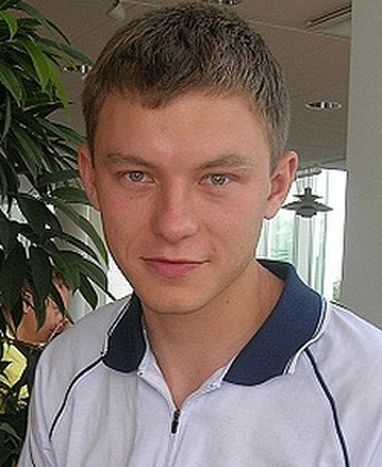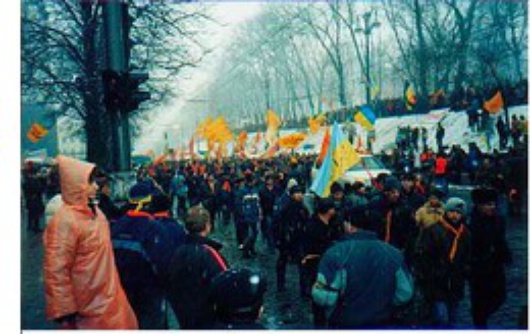
Sergii Oleksiuk: 'It's like a Yanykovich-Yushchenko soap opera'
Published on
Three years on, a 23-year-old key figure in the youth movement during the Orange Revolution considers his country's latest stalemate
'It's hard to explain the current parliamentary crisis in a few words, especially for people living in democratic countries,' says Sergei Oleksiuk, a 23-year-old political sciences student (BSC) at the National University of Kyiv-Mohyla Academy and current managing director of the 'Youth for Sustainable Development' NGO.
We meet in the botanic gardens in the centre of Kiev - a far sight from the winter frost of 2004, where Oleksiuk was busy setting up tent cities as a leader of the 'Youth Wave' during the Ukraine's Orange Revolution (November 2004-March 2005, after the rigged 2004 presidential elections). Thousands of students like himself rallied together to sleep on the capital's streets, to 'show that we could not stand Soviet standards and were fighting for new ones.'
How did you become a leader in the Orange Revolution?
There was this feeling which killed me - when you know that you have been cheated, and you understand that you can't change anything. I understood that if I didn't do something to protect my country and myself, I would have to move elsewhere.
 I stirred up some movement in my university, beginning with my circle of friends, and it all snowballed from there. Kyiv-Mohyla Academy's students were amongst the first who came out onto Kreshatik, the capital's main street. I organised young people and directed their energies. But I didn't have a leading role - there were thousands like me.
I stirred up some movement in my university, beginning with my circle of friends, and it all snowballed from there. Kyiv-Mohyla Academy's students were amongst the first who came out onto Kreshatik, the capital's main street. I organised young people and directed their energies. But I didn't have a leading role - there were thousands like me.
Can you explain the current impasse?
In developing countries, the parliamentary coalition is built on the basis of the parties being united. But in the Ukraine, it was being built on the basis of the out-bidding and enticing of individual deputies. The 2006 election results show that the majority of parliamentary seats were gained by political parties which (during this period), positioned themselves as 'Orange' (president Yuschenko's party colour) parties.
The 'blue' camp or the prime minister's Yanukovich coalition (pro-Russian) was formed after the subsequent manipulation of the majority. The starting point of this crisis was current speaker of parliament and Socialist party Oleksandr Oleksandrovych Moroz's 'betrayal', when the Orange coalition ally went on to become Yanykovich - blue coalition's partner for some 'mysterious' reason. It created a power boost in the blue coalition, resulting in the fact that at the moment we have two main power centres. They are pulling Ukraine into two opposite directions by refusing to co-operate principally.
How do other Ukrainian young people feel about current events?
I admit that Ukrainian youth are disappointed by the current political impasse, where parliament has been dissolved completely. Older people view it as a Yanukovich-Yushchenko soap opera.
What we are seeing is an integral part of the transformation of Ukraine from the totalitarian to democratic state. This process needs time and effort. After the Revolution everyone wanted everything, right away – which was impossible. I understand that president Victor Yushchenko isn’t Jesus Christ, and that former first female prime minister Yulia Tymoshenko certainly was not Mary. And I knew that miracles wouldn’t happen after Yushchenko’s inauguration.
So what will happen in the rescheduled parliamentary elections on 30 September 2007?
Almost the same political parties will win the elections as they did one year ago, but the government's structure will be entirely different. It will allow the establishment of a pro-presidential coalition and government. A different meaning will be attached to the strategic foreign policy course of Ukraine - such as EU membership candidature (currently sketched in for 2015).
And what does Europe mean for you?
Above all, Europe is a cultural community. When I first travelled the continent, I understood that Europe also means good water supplies like I saw in Sweden, clean streets as in Finland and new technology in Germany. It means the absence of long lines at train stations, of boorishness at markets, of roughness in the public transport system, and I even felt like there are seemingly lesser homeless people on the street. These things probably seem quite obvious for European citizens, but for Ukrainians they signify ‘European standards’ - which we are trying to achieve in Ukraine.
Do you feel European?
Yes, because I feel strongly that I belong to the European cultural community. If somebody asks me who I am, I would of course say Ukrainian, and then, certainly, European.
Of course, not all Ukrainians would answer this way. Many still believe in reuniting with Russia and continue to call themselves citizens of the Soviet Union. Mainly, this is an older generational way of thinking. I would say that young people mostly don’t care about any cultural or national belonging. Certainly in general, in the east of the country some of the young people are more pro-Russian than pro –West, and in the West vice versa, so it is a reality firmly shaped by history.



